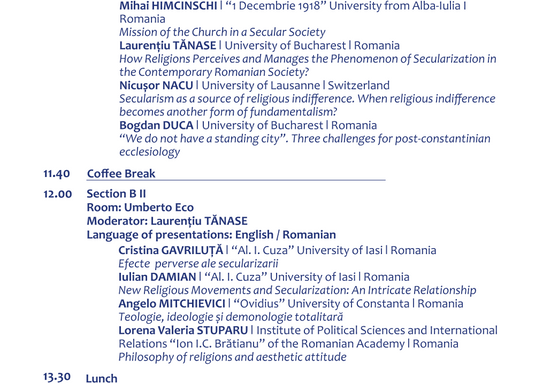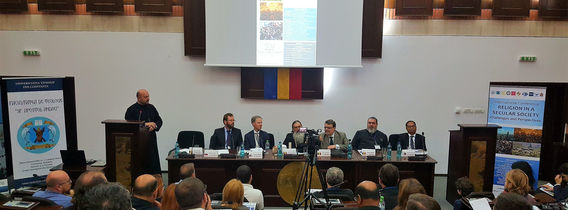
3rd International Conference RELIGION, KNOWLEDGE, SOCIETY (RKS)
Religion in a Secular Society. Challenges and Perspectives
19-20 June, 2017
Constanța (Romania)
It is often argued that the more society modernizes, the more its religiosity decreases. Given the dominance of science, politics and economics in rational discourses, the relevance of technology, the ideology of globalization and the attitude of consumerism and materialism, religious beliefs, practices, values and institutions are losing their relevance to human life and society. Due to modernization the role of religion diminishes. The societies whose religious values are historically embedded in their social institutions are continuously shifting their religious roots towards a non-religious orientation. This process of moving away from religion towards a non-religious or secular type of society - which is called secularization - is based on a philosophical stance which affirms the difference and separation of the religious or sacred from the secular or temporal – secularism. Secularism stresses that religious orientation and considerations must be kept out of temporal or public affairs and vice-versa. Religion should not influence public and political affairs as they are two distinct spheres.
Historically, secularism has emerged in society since the beginning of the modern era, the Renaissance, gained momentum through the Enlightenment period. Enlightenment thinkers like Voltaire and Rousseau challenged the authority of the Church and religion and modern theorists like Marx, Freud and Weber further stressed the decreasing relevance of religion to human and societal affairs. Nowadays, several philosophers and theologians speak of a "post-secular" era in which religion can play an important role in society, depending on how it articulates a theological discourse, contextualized within contemporary challenges, centered on authentic religious values.
The process and phenomenon of secularization and its philosophical basis, secularism, certainly pose critical challenges to religion as well as to its relevance and influence on human affairs and society. The challenge is enhanced by the ideology of globalization and the attitude of materialism and consumerism. Hence, today is the appropriate time to discuss the challenges of secularization and secularism to religious values, beliefs and practices and provide an appropriate response to these challenges. This is posed more importantly to the believer or practitioner of religion to examine his religious values and beliefs in relation to what is going on in the world.
The conference aims to answer the following questions:
-
What are the meanings of secularization, secularism and post-secularism, from a theological, sociological, philosophical, political and cultural perspective?
-
What is the relevance of religion in public space given that the theories of secularization have been replaced by post-secularism theories?
-
How does political power try to regulate and decide the place of religion in the public space?
-
How do the theories of (post)secularization affect the relations between the political and spiritual power, and especially how are they reflected in the interreligious and intercultural dialogue?
-
How do traditional religions relate to new forms of religiosity that tend to take the place of traditional ones?
-
Can traditional religions be used as a resource rather than as threats in structuring the public space?
-
Is secularization a counter reaction to an empty religious or spiritual space?
-
How can religious freedom be expressed in a secular society?
-
Can we speak about secularization in Judaism, Buddhism, Hinduism, or Islam?
Scientific committee
Teodosie PETRESCU - Archbishop of Tomis, Faculty of Theology, “Ovidius” University of Constanța (Romania)
Costel MITU - Dean of Faculty of Theology, “Ovidius” University of Constanța (Romania)
Nicolae ACHIMESCU - University of Bucharest (Romania)
John FARINA - "George Mason" University (SUA)
Katarína VALČOVÁ - University of Žilina (Slovakia)
Jannel ABOGADO - Center for Religious Studies and Ethics, University of Santo Tomas (Philippines)
Michal VALČO - Constantine the Philosopher University in Nitra (Slovakia)
Jove Jim S. AGUAS - University of Santo Tomas (Philippines)
Mohamed Ahmed SULEYMAN - “Beni Suef” University, Cairo (Egypt)
Alexander CHIRILA - Webster University (Thailand)
Dan-Gabriel SÎMBOTIN - Romanian Academy - Iași Branch (Romania)
Ismat NASSAR - “Beni Suef” University, Cairo (Egypt)
Sergei NIZHNIKOV - Peoples' Friendship University of Russia (Russia)
Cristina GAVRILUȚĂ - “Al. I. Cuza” University of Iași (Romania)
Ana PETRACHE - University of Bucharest (Romania)
Nicu GAVRILUȚĂ - “Al. I. Cuza” University of Iași (Romania)
Laurențiu TĂNASE - University of Bucharest (Romania)
Florina HARIGA - “Al. I. Cuza” University of Iași (Romania)
Bogdan CHIRILUȚĂ - “Ovidius” University of Constanța (Romania)
Edward ALAM - Notre Dame University (Lebanon)
Ioan DURA - “Ovidius” University of Constanța (Romania)
Organizing Institution
-
Faculty of Theology - “Ovidius” University of Constanța (Romania)
-
Department of General and Applied Ethics, Faculty of Arts, Constantine the Philosopher University in Nitra (Slovakia)
-
Center for Religious Studies and Ethics, University of Santo Tomas” (Philippines)
-
Department of Philosophy, Faculty of Arts, "Beni-Suef" University (Egypt)
-
Global Citizenship Program & ESL, Webster University Cha-Am Main Campus (Thailand)
-
Faculty for Humanities and Social Sciences, Peoples` Friendship University of Russia (Russia)
-
Department of Philosophy and Religious Studies, Faculty of Humanities, Žilina University in Žilina (Slovakia)
-
Center for Interreligious and Intercultural Studies and Dialogue, University of Bucharest (Romania)
-
Center for Culture and Education, Archiepiscopate of Tomis (Romania)
Organizing committee
Adrian VASILE - “Ovidius” University of Constanța (Romania)
Teodosie PETRESCU - “Ovidius” University of Constanța (Romania)
Carmen MANOLE - “Ovidius” University of Constanța (Romania)
Alina Mihaela HAGEA - “Ovidius” University of Constanța (Romania)
Ioan DURA - “Ovidius” University of Constanța (Romania)
David TELEAGĂ - “Ovidius” University of Constanța (Romania)
Florin SPANACHE - “Ovidius” University of Constanța (Romania)
Programme &Photos

























